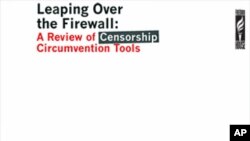As the Internet plays a major role in organizing protests and disseminating information across the Middle East and other parts of the world, a report released Tuesday by the human rights organization, Freedom House, tells how Internet censorship circumvention tools are effective in navigating around censors. But the report warns about the security implications of such software.
The report gives Internet users guidelines for choosing effective and easy to use circumvention tools in countries with high degrees of Internet censorship.
Based on a survey of Internet users in Iran, Azerbaijan, China and Burma, the report found all 11 censorship circumvention tools to be effective, and outlines the advantages and disadvantages. It recommends tools based on one's Internet habits, either as a downloader or uploader of information; one's preference for either security or speed; and the level of privacy and security desired.
Cormac Callanan, head of Dublin-based Aconite Internet Solutions and an author of the report, urged caution when using censorship circumvention tools.
"Circumvention is not security," said Callanan. "Security, anonymity and privacy are important and do need to be addressed. For end users, we can only repeat that security is more than a single circumvention tool. And that it becomes a way of life."
Circumvention tools allow Internet users to bypass filters that block content, in this case by repressive governments, and to find an alternate path to access the information.
In the report, users indicated that they preferred quick rather than secure Internet access. Callanan says the finding surprised him, but says locals better understand the censorship situation and its consequences.
"They have more real time and local knowledge about what is happening in their government censorship system, or the local policing or the local monitoring than many of us do internationally," he said.
The U.S. State Department-funded report found that security is more important for users who are sending material rather than those accessing and viewing information on the Internet.
Voice of America uses these tools in countries like Iran and China so users can bypass government blocks on VOA's webpages. On Thursday, the U.S. government gave VOA's governing agency the Broadcasting Broad of Governors $10 million to expand the use of these tools.
Freedom House's Project Director for Internet Freedom, Robert Guerra, says the circumvention software is not only for activists.
"I think to popularize the tool, we have to depoliticize," said Guerra. "It’s not to access blocked sites. It’s to access things that may be blocked that aren't necessarily threatening. One may want to access cooking YouTube videos, but if YouTube is blocked, that is a bad thing."
Karen Rielly, development director for the Tor Project, a circumvention software company, says that even her organization can not see who is using the software.
"Tor separates where you are going online from where you are coming from," said Rielly. "Its hides your IP [Internet protocol] address, which can be linked to your physical location."
Rielly notes that Tor and similar products were widely used in Egypt prior to the government taking the country offline during recent protests. Egypt was not the first country to nearly shut down its Internet access. Burma, Nepal and China have used similar tactics.
Last week, U.S. Secretary of State Hillary Clinton said restrictions on Internet activity that prohibit free expression is one of three worrisome trends concerning human rights.




